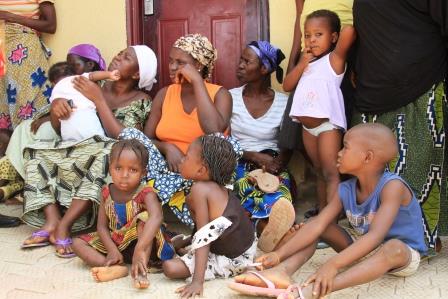By Ndidi Chukwu.
Developing a road map for promising intervention which will strengthen Nigeria’s reproductive, maternal and newborn health policies in the country, was the high point of the just concluded two days policy dialogue session on maternal health in Nigeria.
The dialogue, which had the theme, “Maternal Health in Nigeria: Emerging Priorities” attracted the best of Nigeria’s Health Stakeholders, both Obstetricians and Gynecologists and top government officials on family health.
The Federal Ministry of Health dialogue session which was organized by Wilson Center, University of Ibadan Center for Population and Reproductive Health, Maternal Health Task Force, and UNFPA tried to generate evidence based shift in policy for improved reproductive health and maternal care by “research sharing” and “disseminating lessons learnt” from different stakeholders in their various fields, and adopt newer and workable policy, institutional capacity in delivery of quality care.
With 5.5 percent fertility rate being recorded in Nigeria, according to 2013 National Demographic Health Survey, Nigeria contributes to 10 percent of global maternal health burden, with 576 per 100,000 live births (NDHS 2013) Prof. Oladosu Ojengbede Director Center for Population and Reproductive Health, College of Medicine, University of Ibadan, said the consultation for the dialogue session for the stakeholders is to address many critical and neglected maternal health issues. “We want to identify best practices, gaps and areas requiring focused interventions in maternal health in Nigeria” Ojengbede said
Ojengbede Observed that maternal deaths in Nigeria have links to Obstetric Fistula caused by early marriage, birth related complications that were not given immediate attention and rising rate of post abortion deaths, but said “advocacy for good political will, for rural development and access to health care is key”
Earlier in his welcome address, Director Family Health Department, Federal Ministry of Health, Dr. Wapada I. Balami, said the FMoH recognizes that maternal and child health have remained a major public health concern in Nigeria adding that the Federal Government has “invested considerably with support from development partners in these areas.” Balami agreed that achieving MDG 5 by 2015 is an “extremely herculean task, though not impossible one.”
Despite Nigeria’s annual commitment of $3Million since 2011 toward family planning commodity security, and several initiatives and interventions, Balami insisted that Nigeria still faces “an uphill task in the attainment of the goals with challenging maternal mortality ratio and under five mortality rate.
In accelerating the achievement of MDGs 4 and 5, Nigeria has developed five distinct interventions
- Saving one million lives by 2015 initiative
- Increasing health budgets including those for maternal health and family planning services and commodities.
- The Nigerian family planning blue print was successfully launched and disseminated to all states.
- Civil Societies involvement and participation in programming and tracking of resources for women and children’s health.
- Establishment of the Midwives Service Scheme, Conditional Cash Transfer and SURE-P MCH, and the Integrated Maternal Newborn and Child Health Strategy
Balami is however hopeful that the outcome of the dialogue session could give a guideline towards bringing the many agenda to achieve one aim of reducing maternal deaths to its barest minimum before the end of 2015.




